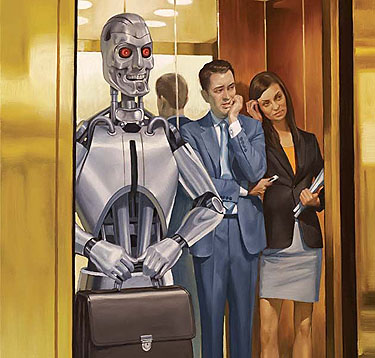I haven’t read Tyler Cowen’s Average Is Over, but I’m familiar with its basic thesis: smart machines are going to put lots of people out of work over the next few decades, and this is going to substantially increase income inequality. A small number of very smart people will do really well, while the broad middle class will end up with bleak, low-paying jobs—assuming they’re lucky enough to have any jobs at all.
Obviously I agree, as readers of the May issue of Mother Jones know. And since I enjoy reading opposing arguments, I was curious to see what James Bessen had to say about this today over at The Switch. Unfortunately, the answer is: nothing much. “People have been  predicting that technology will kill the middle class since Karl Marx,” he says. “They have generally been wrong.”
predicting that technology will kill the middle class since Karl Marx,” he says. “They have generally been wrong.”
Well, yes, they have. Unfortunately, that’s his entire argument. The Industrial Revolution didn’t put everyone out of work, and neither did 80s-era technology like ATMs and accounting software. Therefore, 2030s-era technology won’t either.
This is, literally, the worst possible case you can make for the continued relevance of the middle class. To say that “intelligent machines per se are not new,” as Bessen does, wildly misrepresents both intelligence and machines. No machine built before about 2010 has had anything even remotely resembling true intelligence. Not spinning machines that stopped if a thread broke, and not ATMs or accounting programs. Even now, the smartest machines out there display only the barest glimmers of intelligence. We simply don’t have either the software or the hardware to do it. The machines that people like Cowen and I are predicting for the 2030s just flatly have no analog to previous machines.
Those machines won’t need help from ordinary humans. In fact, as they get smarter and smarter, they won’t need much help from really smart humans either. Eventually, they won’t need any help at all. Past machines always did, and that’s the decisive difference. If you wave this away, you’re missing the whole debate. You’re pretending to argue without actually addressing the main point of the techno-optimists: What happens to human labor when machines are smart enough that they need virtually no human guidance at all?
Bessen simply ignores this possibility. Apparently he thinks that future machines will get a little bit smarter, but will remain just dumb enough that they’ll continue to need constant attention from an army of folks who graduated from high school with a C+ average. But if that turns out to be the case, there’s really no interesting conversation to be had. The future will be pretty much like the present. Why even bother talking about it?
But the evidence suggests, rather, that we’re on the cusp of big changes. Machines in the future will be a lot smarter than current machines, and they won’t need constant attention from much of anyone. If you want to engage with this debate, you need to present a cogent argument that either (a) machines will never get all that smart, or (b) even if they do, there will still be a substantial role for average humans to play. Bessen does neither.


















